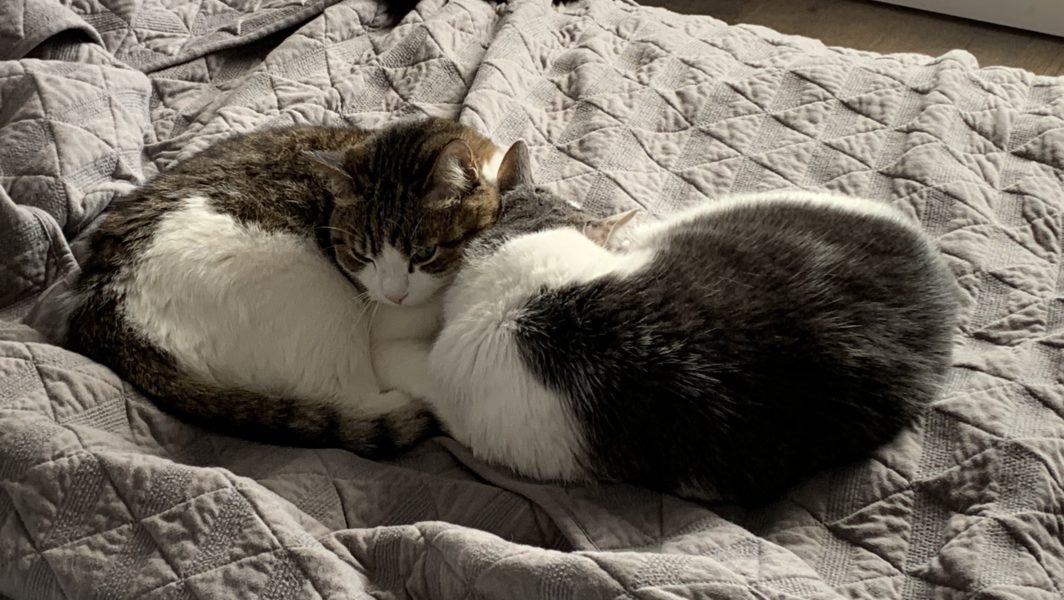As a startup founder, I get asked one question more frequently than any other: “Why did you start your company?” Naturally, I can answer this from many different angles, but the most pure and essential is simply this: I believe that agreement is magical.
I’m not a lawyer by trade; I’m a software developer. But back in college, I did take one course in the Legal Studies department which was predominantly focused on contract law, and one essential element of a contract has stuck with me ever since: the meeting of the minds. It really just means mutual agreement, as in, for a contract to be valid, both sides must actually agree with its essence. Duh, right? But when I really contemplate this catchy, alliterative phrase, it evokes a mental image that borders on spiritual: two people (or maybe even more, and maybe with one or more representing organizations), are in a state of mental harmony about a planned future.
The future bit is key. My cats clearly experience harmony every time they cuddle – which is about 15 times a day. But that’s an unplanned, present phenomenon, and one which, 14 of those 15 times, turns instantly into something else entirely when one decides to smack the other and dart across the apartment. And even though every time, the recipient of the sucker punch gets a stunned look on his/her face that says, “Hey, I thought this was ‘us’ time!” – there was clearly no agreement in place. It just felt good, in the moment, to cuddle… until one decided unilaterally that play-fighting would feel even better!

Cats and other animals don’t plan together for the future (aside from instinctual behavior, which isn’t a conscious decision), and so while they can and do live in accordance with one another in groups, they can’t actually agree. As far as we know, only we humans can do that, and so while many consider the idea of a contract to be dry and boring, I see it as the manifestation of a uniquely human trait – and I find that very special.
Let’s look at the simple example of a Mutual Non-Disclosure Agreement (“MNDA”). This is the type of contract that companies tend to sign with each other before actually doing anything substantial. “Mutual non-disclosure” is very technical and, of course, legalistic sounding, but all it really means is: “We’re going to start talking to each other, and we’re going to keep what we talk about a secret, away from everyone else.” When I put it into plain English, using the language of shared secrets, it starts to sound not only special, but downright romantic! (And while relationship contracts are quite an interesting topic, just to be clear, I’m not suggesting that starting with an MNDA is a good way to find love.)
Still, even if MNDAs are mundane in the course of daily business, that doesn’t make them not special, just as saying “I love you” to your significant other every night before going to sleep doesn’t make it not special. An MNDA still does represent a genuine meeting of the minds regarding the intent to initiate those secret discussions. And if those discussions go well, it’s likely that the “parties” (i.e., people) involved are contemplating a more substantial transaction of some sort, which, in order to consummate, will require an even more significant and lasting meeting of the minds. I’m not just waxing philosophical here either; every contract I’ve ever signed really does feel special to me. Each time, it means that without a doubt, in that moment in time, and despite our own respective free will and agency as humans, I have a shared vision with another person about some aspect of the future. That’s a beautiful, magical feeling.
Alas, this is where we come face to face with the other side of the coin, what I call the tragedy of contracts. Even if the occurrences of human agreement are magical, the documents that formalize these agreements are most definitely NOT, for two reasons. First, they tend to be written in esoteric legalese, which is frustrating to most people, but at least Google (and lawyers) can help out with translation. More problematically, though, the bulk of a typical contract is spent describing what will happen if and when the minds no longer meet. This convention belies a very pessimistic view of human nature, and it can sow doubt and suspicion where there really was cause for none.
Certainly there are plenty of times when people initially think they agree with one another, but upon further exploration, they discover that their minds have not in fact met. No big deal – that’s life! But when both sides can feel genuine agreement in the air, but the process of attempting to “paper” (as lawyers say) that agreement into a contract causes the whole thing to explode, that state of affairs is, indeed, every bit as tragic as a missed connection.
My aversion to that tragedy is why I started Outlaw, and it’s also why I did so with a co-founder who is a UX designer. We’re not a law firm, so we don’t advise on contract language, but we do provide a rich suite of tools that make for the world’s smoothest agreement-to-contract experience, for everyone involved (especially recipients) – not just the sender or the sender’s counsel. And our best customers share our philosophy that when the minds have already met, getting into contract should not feel like a tragic drama; it should feel like magic.



